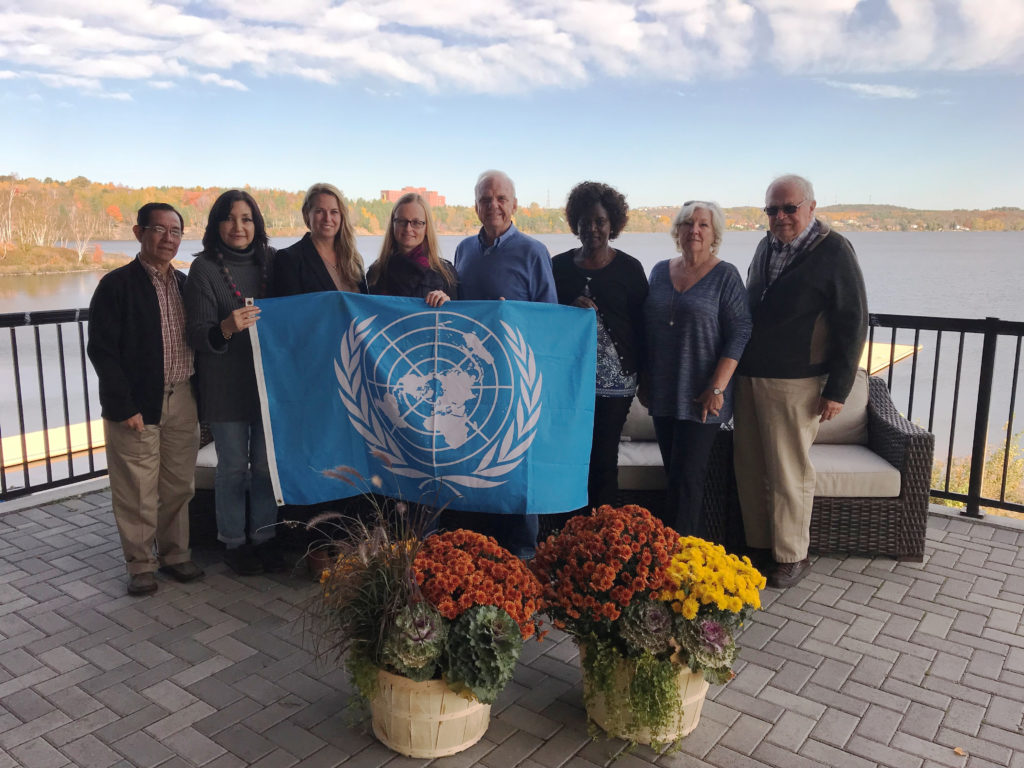One of the many ways York University drives positive change is through the work of its United Nations Educational, Scientific and Cultural Organization (UNESCO) Chair in Reorienting Education Towards Sustainability, a position held by Charles A. Hopkins. For over two decades, Hopkins has championed education for sustainable development (ESD) initiatives. In 2017, he launched the #IndigenousESD Network, the first global research network dedicated to enhancing education for Indigenous youth within the framework of the United Nations (UN) Sustainable Development Goals (SDGs).
The SDGs call on member countries to take action in areas that are critical to ensure peace, partnership, and prosperity for people and the planet. York University is answering the call. The new York University Academic Plan (UAP) challenges the University community to elevate its engagement with the SDGs.
Globally, Indigenous Peoples are among the most vulnerable groups when it comes to access to education. The #IndigenousESD Network brings these issues to the forefront of conversations within the UN and beyond. The focus of this network is researching both “if” and “how” ESD practice can improve the education and training of Indigenous Peoples around the world. ESD, as a holistic learning concept, can empower learners to make informed decisions and take responsible actions for a sustainable future. It has been recognized as an integral element of SDG No. 4 on Quality Education, which is a key enabler of all other SDGs.
"Reorienting Education and Training Systems to Improve the Education Outcomes of Indigenous Youth" is one #IndigenousESD global research project coordinated by the UNESCO Chair that has reached Indigenous communities in over 40 countries. The research involved helps strengthen Indigenous voices, provide policy advice, and inform the SDGs to reach the least-served first and ensure that no country or person is left behind.

Pictured above, left to right: #IndigenousESD co-ordinators D. Razak (Malaysia), T. Shakirova (Kazakhstan), C. Matheson (Canada), K. Kohl (Germany/Canada), Charles Hopkins (Canada) and M. Otieno (Kenya), with donors Carol and Andre Kozak. (Photo by Sherri Moroso, City of Greater Sudbury)
Answering the call
The UNESCO Chair’s work in driving positive change by taking concrete action on the UN’s commitment to quality education appealed to donors Carol and Andre Kozak. The couple was inspired to support the Chair when they learned about the struggles of Indigenous children and realized how seldom Indigenous education research was funded. “A respectful dialogue on quality education that would connect Indigenous Peoples from different countries to strengthen their voice seemed crucial to us,” says Andre Kozak.
The Kozaks' generosity helped bring together stakeholders from five different UN regions to spark conversation about quality education for Indigenous children and youth. Planning meetings were held in Malaysia for the Asia-Pacific region, in Chile for the South American region, in Nigeria for the sub-Saharan African and Southern African regions, in Kazakhstan for the Central Asian region, and in Canada for the Central and North American regions. Carol and Andre provided hands-on involvement by meeting with coordinators from Malaysia, Kazakhstan, Kenya and Canada.
As a result of these meetings, the following research initiatives were agreed upon by all regions:
- In 2018-19, researchers documented varying perspectives on quality education and its desired outcomes as seen by ministries of education, Indigenous community leaders, schools, parents, students and other stakeholders in 54 settings in 29 countries. Ten recommendations were made to UNESCO for their engagement with Indigenous Peoples and published in peer-reviewed journals.
- A collection of “Good Practices using ESD,” with 32 practices from 29 countries, was submitted to the UN’s Office of the High Commissioner Special Rapporteur on the Rights of Indigenous Peoples to support the COVID-19 recovery of Indigenous Peoples, with education at the core of all efforts.
- When the pandemic lifts, selected researchers and Indigenous communities will jointly implement specific changes in the curriculum or pedagogy to better understand their potential to improve the overall quality of education.
Building a better future
Beyond research, the Kozaks' support has been integral in helping members of the #IndigenousESD Network build partnerships with Indigenous communities and government agencies to help inform pandemic relief strategies and address ongoing social and economic challenges.
In the Philippines, for example, network member Leyte Normal University (LNU), under the leadership of Jude Duarte and Janet Presnilla-Espada, launched a whole-community partnership with two schools and their communities to make quality education accessible by creating a long-term supportive pipeline from primary school to post-secondary. Also, when the homes of the Mamanwa Tribe were flooded, LNU assisted with resettlement efforts. During the COVID-19 pandemic, LNU has been crucial in helping with food and supplies as the villages lost business opportunities during lockdowns.
“It is our hope," says Carol Kozak, "that the research findings will be used to better serve Indigenous youth and inspire to build strong partnerships with Indigenous communi
Article from the June 23, 2021 issue of Yfile
